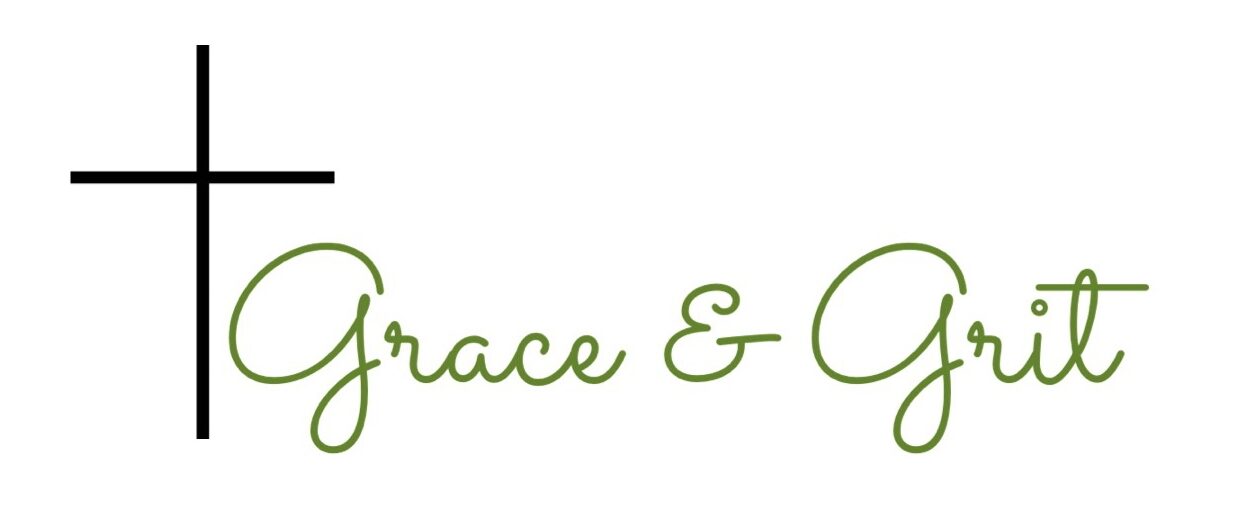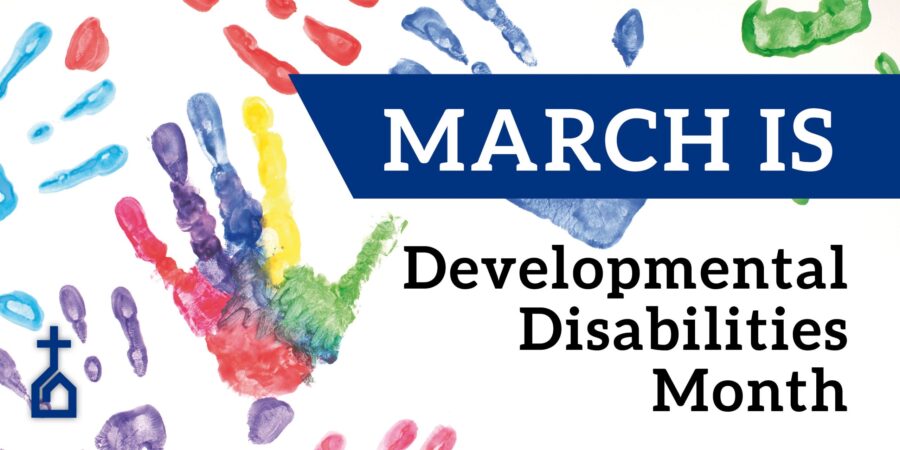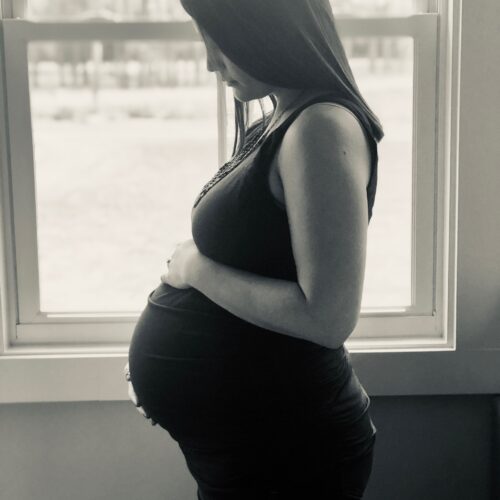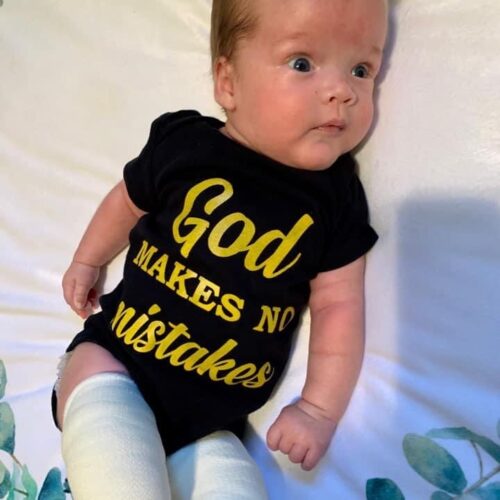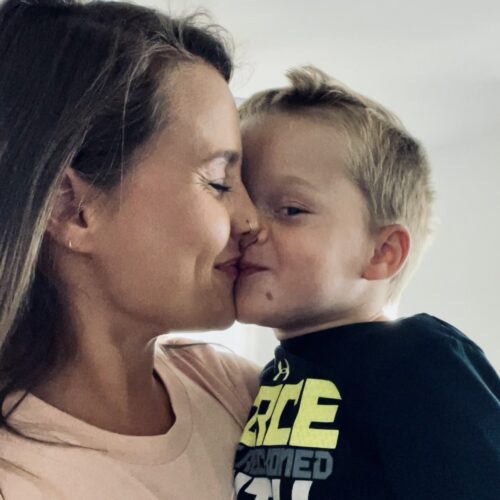March is National Disabilities Awareness Month so I thought I’d share a few of my current musings as the mother of a son with Spina Bifida. We’re coming up on the 3rd anniversary of our “Diagnosis Day”; on April 4th, 2020 we found out at our 20 week anatomy scan that something was wrong with our baby boy. Christopher “Tate” Harrison was named on that somber car ride home & what a ride we’ve been on ever since!
Let me share a behind-the-scenes look into the various appointments, milestones, & updates from just this month of March alone. This month Tate will have had 9 physical therapy sessions, 5 developmental/play therapy sessions, and 4 speech therapy sessions. He saw an orthotist to be measured for new leg braces that will assist him in standing & using his walker. Those came in pretty quickly & he began to really take off with the new walker his dad built for him. We had a surgery consult for the upcoming procedure Tate will have done in April, a cecostomy, which will address his neurogenic bowel management. His first insurance-approved manual wheelchair was delivered this month after 4 months of waiting! Lastly, I completed paperwork & interviews for a special needs preschool in our county that helps to bridge the gap of any developmental delays that children like Tate might have due to their disabilities. We’re waiting to have his evaluations completed & then they’ll recommend a plan for him at their school this Fall. Besides all of the above, there’s the extra day-to-day care that Tate requires like being catheterized 4 times per day, the daily enemas to prevent bowel issues, & trying to achieve an hour per day in his special back brace & stander. Fortunately, we’re one of the blessed few families that are able to have the help of a CNA in our home to assist with meeting the many additional needs that Tate has. This month I’ll have had about 80 hours of extra hands to assist me in the juggling act that is being the parent of a child with a disability. I’m grateful for every single one. Tate is thriving. He is happy. He is a typical toddler boy with an attitude, an obsession with tractors, & a pinky finger that has his mama wrapped. We fought a lot of battles to get to where we are, but we also realize we’re not fighting alone & the same God that fearfully & wonderfully made Tate & chose us to be his parents is sustaining us every step of the way.
To be clear, I didn’t share all of the above for sympathy or applause or attention. I share it because this month is about awareness & you probably know a family in your church or school or neighborhood that loves & cares for a person with a disability, right? Pause & think about all that you’re not aware of when it comes to their diagnosis or daily care. We truly have NO idea what stories lie behind the handicap placard of the car next to us, the mom with seemingly healthy children in her shopping cart, the crowded doctor’s office on our commute to work, the individuals moving slowly or operating some type of device/equipment to do something trivial that we completely take for granted. We’re so unaware. Of course we can’t possibly know everything there is to know about the person at the stoplight next to us, there’s no shame in that. My point is, we ought to have a general “awareness” that we never can truly know all that a person is going through & that ought to lead us to cultivate an overarching theme of kindness and thankfulness in our lives. However, while we can’t know the backstories and diagnoses of every person we pass at the mall, we often remain completely unaware of the stories, the struggles, & the victories that people with disabilities are experiencing right under our nose at school, or work, or church, or even in our families. And that’s only shameful if we allow it to stay that way. Awareness literally means: knowledge or perception of a situation or fact; concern about and well-informed interest in a particular situation or development.
Who has God placed in your life that has a disability? Are you aware or well-informed about their diagnosis? Have you made it a point to do a little research to educate yourself & gain knowledge about it? Have you expressed concern or interest to them about their unique situation? I’m not saying we need to point out and coddle and disingenuously engage with every person we encounter that has a disability. No. Please don’t. What I am saying is to love the people with disabilities that God has placed within your reach. And I’m saying that to love them well, it starts with being aware. Awareness should lead us to gain knowledge so that we can then express interest or concern genuinely, while keeping in mind that we’re not trying to get to know a diagnosis, so much as we’re attempting to build a relationship with a person.
I’m a mom of a child with a disability, yes. But I’m not any different than you. I’m not a superhero because of the extra things I juggle or because my child will have had more surgeries by the time he’s 5 than yours will in their entire life. I am doing exactly what you would be doing if you were given the privilege to love and raise a child with a diagnosis like my son. Our children may be different, but mostly we’re the same.
I want your kid to play with my kid at the park.
I want you to ask questions, show concern, & express interest about my family.
I want you to ask how to pray for me & it means so much for you to follow up about what I shared.
I want you to give attention to all of my children, not just one.
Here are a few real-life examples of how people have interacted with us in both positive and negative ways…
Recently our family was walking across the parking lot to enter a store & someone saw Tate in his chair, rolled down the window, & yelled out to us “look at him in those wheels! He’s so CUTE!” And it’s true- I’m not biased; he is the cutest thing on wheels. I don’t mind people stating the obvious😉But when the almost exact same thing occurred later that day, I finally realized why it rubbed me the wrong way. For the second time Tate had been singled out in a public way in regards to his chair, but my other children were completely ignored. Everywhere we go, people comment on Tate’s neat ride. It’s to be expected. We love to share the nonprofit that made his chair with others in hopes other kids can find their freedom too or donations will be made to accomplish that. (Some people strangely don’t even realize it’s a tiny wheelchair, we’ve heard it called all kinds of things & often we hear, “I wish I had one of those!” Umm, no you don’t.) I give this example to show that we welcome others noticing Tate’s chair, engaging him in conversation, & complimenting his wheels – HOWEVER, shouting across a parking lot, ignoring his siblings, & saying you wish you had a “scooter” like that aren’t appropriate. I think it’s helpful to consider how an adult with a similar disability might feel about such treatment- embarrassed, isolated, annoyed.
Another example was a little girl at the park going down the slide next to Tate. Her mom was right beside her helping her down when the probably 2-3 year old pointed at Tate’s braces and said, “what are those?” Totally valid and age appropriate question for a curious toddler. The mom pleasantly surprised me when she said, “those look really cool. How about we ask your new friend his name first and see if he’d like to tell us more?” I briefly said they were braces, they helped his feet, & pointed out the airplane/truck designs they had on them. Then I asked her if she had cool braces like that, what did she think she would choose to get on them? After her reply, her mom suggested she ask Tate if he wanted to play tag with her and her sister. Tate wanted to swing instead & again the mom modeled how to say “nice to meet you Tate, thanks for showing us your braces, maybe we’ll see you on the swings later.” The whole interaction was less than 3 minutes. What the mom did was show how curiosity is fine, but we should first get to know the person before we fire off questions. I kept my answer short, age appropriate, and put the question back on the little girl to show how her and Tate were the same, he just had cool braces and she didn’t.
A grounds maintenance man at the park needed to observe and reflect on this exchange because he had a lot to learn! 🤦🏼♀️He walked right up to me one day, with Tate & Willow at my side, & point blank asked without acknowledging them or saying hello, “what’s wrong with his legs?” I answered just as bluntly, “This is Tate and he has Spina Bifida and clubbed feet. Good morning to you too!” He had to be 60+ but at my response he realized he wasn’t minding his manners & thankfully he walked away quickly & sheepishly with no more questions. I later thanked that mom at the playground for the refreshing way she handled her daughter’s questions. My son isn’t a kid on hot wheels, with cool braces, and a scary disability. First of all he’s Tate. He’s 2. He likes trucks. And that mom totally got it. That man totally didn’t. You don’t need to stress about how to introduce yourself or talk to a person with a disability. You proceed just how you typically would with anyone else. As you build a connection, polite questions regarding their obvious disability are totally appropriate when they’re respectfully asked and when they don’t dominate the entire interaction in a way that might make that person feel uncomfortable. Be aware. Be kind.
I hesitated to share the above examples because what I don’t want to do is make people so afraid to say the wrong thing that they never say anything at all. Equally as cringey as the maintenance man above, are the people (usually online) that have a new phrase every other week to be politically correct in how we talk about the disabled, shaming people for being discriminatory or ignorant if they can’t keep up with the times. Obviously, don’t call my son a cripple. But I’m not going to bite your head off if you say “special needs” versus “handicapped” or “disabled” versus “differently abled.” Honestly I don’t even know which one I prefer! 🤷🏼♀️ When in doubt, just ask. What I don’t want to do in sharing my perspective is to cause people to be so concerned about not saying/doing the right thing that they further avoid people with disabilities. There was a wave & a smile for the person that hollered across the parking lot at us. There was grace through gritted teeth for the grandpa that should’ve known better to be so impolite. I think a good rule of thumb is to consider the setting. If you’re passing a stranger in the grocery store, it would be weird to comment or ask questions about their disability. If you’re sitting next to them enjoying a picnic at the park, having extended conversation while the kids play, that makes more sense. And most importantly, if they’re across the pew from you every week, in the lunchroom with you every day, living next door, or at all the family get togethers- love THOSE people well by being aware, educating yourself, and showing genuine interest. That’s how we bear each other’s burdens and love those that God’s put within arms reach.
Lastly, growing in awareness doesn’t have to be a big, scary, complicated thing. Our family loves to read and we visit the library about once per week. I recently discovered that there’s a place in the nonfiction children’s section at our branch dedicated to disabilities. Titles like “Using a wheelchair”, “I have diabetes”, “What it means to have Cerebral Palsy”, “Some kids wear leg braces”, “All about disabilities”, and “My friend has a food allergy” were on the shelves. We were pumped to check out the book about kids with leg braces and Tate enjoyed seeing kids with walkers like his. As I read it to my kids though, I couldn’t help but think, “this would be more beneficial for other families to read…mine already know this & it’s our normal.” Growing your awareness and involving your kids could simply look like checking out books like these at the library and talking about how we’re going to encounter people that look this way, use these devices, have these struggles, etc. & chat about what they might do if they have a friend like this in their class at school. (The book I’m reading to my kids in the picture above was written by one of the authors & hosts of the podcast called Risen Motherhood – order yours here.) A bonus would be finding an age appropriate book or video that’s specific to the disability or difference of a loved one, neighbor, church member, classmate, etc in your life so that you can briefly gain some knowledge about what they may be facing and know how to love them better.
I recently met someone new that asked about Tate’s condition. We were having dinner at a mutual friend’s house and our children were playing together. Towards the end of the evening, she asked about Tate since he obviously was getting around differently than the other kids. I had noticed her down on the floor talking and playing with him earlier. I shared a little bit about our story, his diagnosis, and answered her questions that were more medical in nature than most since she’s a nurse. She’s a fellow believer and was encouraged by our testimony. At some point she said, “I’m sorry for the extra hardship your family must go through.” I saw her pause & her facial expression change as she contemplated if that was the “wrong” thing to say. She started to apologize. I reassured her that I wasn’t offended by what she said at all. The setting, the intention, the questions that showed interest & concern, her engaging my son in play & getting to know his name, age, & other things about our family prior to questions about his disability- it was all appreciated. What I saw was a person genuinely and compassionately seeking to understand, to get to know us better, and wondering the whole time if she was “doing it right”, but doing it anyway. That’s what awareness looks like.
Navigating a sin-sick world that includes disability takes grace and grit. For those with disabilities, for those that care for them, and for those attempting to connect with them- lots of grace, lots of grit. I’m encouraged by what scripture records about the life and ministry of Jesus and how surrounded he was with this needy population, how he loved them, and was drawn to them. To love like Jesus loved is to be aware of those around you with disabilities and their families, to be drawn to them, and to strive to love them well.
Loving the least of these by His Grace & My Grit,
💛Hilary
